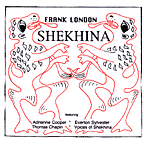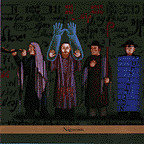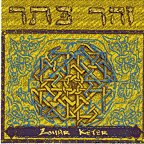For more information:
Note that the latest stuff may not yet be indexed.
The Klezmer Shack directory of articles
 My CD cup runneth over, so I should be logging a lot of exciting releases. But before I get to that ... soon, I need to spend some time on three CDs in particular. On the CD player for the past week, I have been listening first and most often to Frank London's latest, "Shekhina," which is a continuation, in some ways, of the work that he and Greg Wall and friends do in Hasidic New Wave, but also more. This is the most fascinating Jewish progressive music CD I've listened to in a while, and I want to first plug the music which, as expected, is varied and wonderful, tending towards the progressive jazz direction, but mixing in everything from funk to hasidic. A very Jewish album. A very New York Jewish album, even. The sort of New York Jewish album that one can imagine a descendent of New Yorker writer David Evanier (e.g., "The One-Star Jew") making were he just a decade or two younger and a musician. The album starts off with a wonderful poem by, and recited by, Everton Sylvester. The poem has much to do with the black community and perhaps spirituality and this all ties into the concept of "Shekhina," especially as we focus less on pushing out and against the edges of Jewish experience, but rather on knitting the many fractures of ourselves back together.
My CD cup runneth over, so I should be logging a lot of exciting releases. But before I get to that ... soon, I need to spend some time on three CDs in particular. On the CD player for the past week, I have been listening first and most often to Frank London's latest, "Shekhina," which is a continuation, in some ways, of the work that he and Greg Wall and friends do in Hasidic New Wave, but also more. This is the most fascinating Jewish progressive music CD I've listened to in a while, and I want to first plug the music which, as expected, is varied and wonderful, tending towards the progressive jazz direction, but mixing in everything from funk to hasidic. A very Jewish album. A very New York Jewish album, even. The sort of New York Jewish album that one can imagine a descendent of New Yorker writer David Evanier (e.g., "The One-Star Jew") making were he just a decade or two younger and a musician. The album starts off with a wonderful poem by, and recited by, Everton Sylvester. The poem has much to do with the black community and perhaps spirituality and this all ties into the concept of "Shekhina," especially as we focus less on pushing out and against the edges of Jewish experience, but rather on knitting the many fractures of ourselves back together.
It is this image of the Jewish community as a series of shards, of fragments to be knit together--a meta-tikkun olam, in its own way, that gains some strength when one considers two overtly Jewish sung pieces that are on the album: an improvisation on "Shalom Aleikhem," (here "Shabbos Bride") sung by Adrienne Cooper and featuring some amazing soulful trumpet by Frank, here with new melodic wings, and "Avinu Malkeynu," sung in the common (to me) melody. "Avinu Malkeynu" is one of the most poignant, and powerful of Yom Kippur prayers, perhaps one of the few that most Jews still know in our assimilated America. It is such a powerful song, and so well known and so close to universal that Russian Klezmer, German Goldenshtyn could describe playing it for non-Jewish audiences at a symposium at KlezKanada this past summer.
So, on Shekhina, London is performing a tikkun kehila, a community healing and bringing together. Despite the name, the album isn't so much about prayer, but rather, more truly, about aspects of God, in this case, the female aspect of God (going by the name, not necessarily by London's intention). If one thinks of the klezmer revival as one part recovering a music tradition that was nearly lost, and one part rebellion against a community that seemed sterile and pointless (as I often do), then this album represents a turning in full progress. Unfortunately, I'm not seeing the album in stores, nor is there an address on the album cover or notes. E-mail the distributor to purchase a copy, or to get advice on how to get a copy. E-mail Frank London.
 Spending this time with London's "Shekhina," provided a good excuse to add two more albums to the turntable mix that I haven't had a chance to write about, and never seem to have enough time to listen to enough. These, too, appear to be difficult to find in the store, but they are on established fringe labels, so hipper spots, such as "Twisted Village" in Harvard Square (one of my favorite places to look for interesting music, when I'm in Cambridge, MA) should always be good sources. Whether HMV or Tower or Sam Goody will carry them, is another question. But find them. Find these two albums: "Nigunim", which features London, Lorin Sklamberg, and Uri Caine (Tzadik, TZ7129); and then find an album Uri Caine recently released with Moroccan cantor Aaron Bensoussan, "Zohar : Keter" (Knitting Factory/JAM KFR-236). In both cases, you are listening to some of the world's best musicians (London and that eclectic master of all things piano, Uri Caine--not that Sklamberg, with London a founding member of The Klezmatics is a slouch at accordion, himself!) back two of the most amazing vocalists currently performing: Sklamberg, and Benssousan. The first represents an Eastern European, Hasidic tradition and joy of singing, the second introduces the very different, but equally joyous and beautiful North African singing mastered by Benssousan.
Spending this time with London's "Shekhina," provided a good excuse to add two more albums to the turntable mix that I haven't had a chance to write about, and never seem to have enough time to listen to enough. These, too, appear to be difficult to find in the store, but they are on established fringe labels, so hipper spots, such as "Twisted Village" in Harvard Square (one of my favorite places to look for interesting music, when I'm in Cambridge, MA) should always be good sources. Whether HMV or Tower or Sam Goody will carry them, is another question. But find them. Find these two albums: "Nigunim", which features London, Lorin Sklamberg, and Uri Caine (Tzadik, TZ7129); and then find an album Uri Caine recently released with Moroccan cantor Aaron Bensoussan, "Zohar : Keter" (Knitting Factory/JAM KFR-236). In both cases, you are listening to some of the world's best musicians (London and that eclectic master of all things piano, Uri Caine--not that Sklamberg, with London a founding member of The Klezmatics is a slouch at accordion, himself!) back two of the most amazing vocalists currently performing: Sklamberg, and Benssousan. The first represents an Eastern European, Hasidic tradition and joy of singing, the second introduces the very different, but equally joyous and beautiful North African singing mastered by Benssousan.
These two overtly religious album do raise issues with me. I am among those who found in Klezmer a way to express a love for Jewish culture that avoided (among other thorny issues) Jewish religion. Of course, today, when half the synagogues in the known world outside of Israel sponsor klezmer bands, it is no longer the act of rebellion, nor a rare form of music. (Good klezmer, of course, is still rare, but so is good anything.) This is not klezmer, though. It is prayer. In the case of "Nigunim," this is an extension of themes and music that Sklamberg has sung on earlier Klezmatics albums. Most memorably, fans of "Shnirele Pirele," the hasidic nign recorded back in 1992 on "Rhythm and Jews," or of the prayerful parts of the "Dybuk Suite" in The Possessed, will be excited to have an entire album exploring the music. Yet, even here, the album is exploration, as well. Sklamberg's repetition of the theme, almost scat-like, improvising and clapping with Caine's piano on the ending "Tayere Brider" (dear Brother) is a promise of more to come, of a pulling it all together with jazz and jewish and soul and spirit all one.
 "Zohar : Keter," the CD featuring Caine and Bensoussan is outstanding, with some interesting additional musicians including DJ Olive on sampler. Some may recently have discovered the Arabic-Jewish musical traditions of musicians such as Cantor Emil Zrihan (records for Piranha, one of the featured artists at the Ashkenaz Festival in '99). Here, the settings are both authentic North African, with appropriate drumming and rhythm and male chorus, and at times, exploratory and experimental. When I saw just the two: Caine and Bensoussan, at a JAM festival at the Knit a couple of years ago, with Caine on keyboard, the cantor drumming and singing, I was mesmerized. Unlike "Nigunim," however, I don't think that this album represents an exploration by Cantor Bensoussan of his Jewish roots or identity. Rather, I think it is the happy fusion between a man grounded musically and spiritually with an amazing jazz pianist who is equally grounded musically and spiritually (or at least, sounds that way). The result is something more than a commercialization of North African Jewish prayer, but a way of listening to that prayer that will sound familiar to those who join Bensoussan in his regular congregation, and will make sense to those who are following Caine's jazz-dancing keys and chords. That isn't to say that things never get pretentious. I am not overfond of presenting the Sephardic chestnut, "Cuando El Rey," as "Wisdom I" (Hokhma). There is something a bit pretentious there. Yet, I am so glad that JAM has finally released this album. Sometimes though, I listen to Caine chording and Bensoussan trading scat on numbers such as "Eli Eli," and I am blown away. This, in part, is the music we tried so hard to create late nights in Jerusalem when I was doing community theatre. Don't miss it.
"Zohar : Keter," the CD featuring Caine and Bensoussan is outstanding, with some interesting additional musicians including DJ Olive on sampler. Some may recently have discovered the Arabic-Jewish musical traditions of musicians such as Cantor Emil Zrihan (records for Piranha, one of the featured artists at the Ashkenaz Festival in '99). Here, the settings are both authentic North African, with appropriate drumming and rhythm and male chorus, and at times, exploratory and experimental. When I saw just the two: Caine and Bensoussan, at a JAM festival at the Knit a couple of years ago, with Caine on keyboard, the cantor drumming and singing, I was mesmerized. Unlike "Nigunim," however, I don't think that this album represents an exploration by Cantor Bensoussan of his Jewish roots or identity. Rather, I think it is the happy fusion between a man grounded musically and spiritually with an amazing jazz pianist who is equally grounded musically and spiritually (or at least, sounds that way). The result is something more than a commercialization of North African Jewish prayer, but a way of listening to that prayer that will sound familiar to those who join Bensoussan in his regular congregation, and will make sense to those who are following Caine's jazz-dancing keys and chords. That isn't to say that things never get pretentious. I am not overfond of presenting the Sephardic chestnut, "Cuando El Rey," as "Wisdom I" (Hokhma). There is something a bit pretentious there. Yet, I am so glad that JAM has finally released this album. Sometimes though, I listen to Caine chording and Bensoussan trading scat on numbers such as "Eli Eli," and I am blown away. This, in part, is the music we tried so hard to create late nights in Jerusalem when I was doing community theatre. Don't miss it.
Notes by Ari Davidow, 02/27/00
As I move this off the weblog into a file, it is only fair to note some related items. Although I have never reviewed their albums (time! time!), the Philadelphia-based band "Atzilut" would fit nicely in with these recordings. Basya Schechter's band is called Pharaoh's Daughter. Their second album, especially, "Out of the Reeds", is also part of this movement. And finally (for the moment), "With Every Breath: The Music of Shabbat at Bnai Jeshurun." Here, at Marshall Myer's (z"l) old congregation (he, from Argentina, is known to many of us for his support of the Sanctuary Movement, but that's all most of us non-New Yorkers know about him, or the congregation he led until passing away several years ago), something is going on, and I'd like to know more about what it is, because there is a diversity of Jewish religious song, sung by a men's and women's voices (including the lovely Basya Schechter of Pharoah's Daughter), backed by an interesting panoply of New York's Radical Jewish musicians from Marc Ribot to Anthony Coleman.

